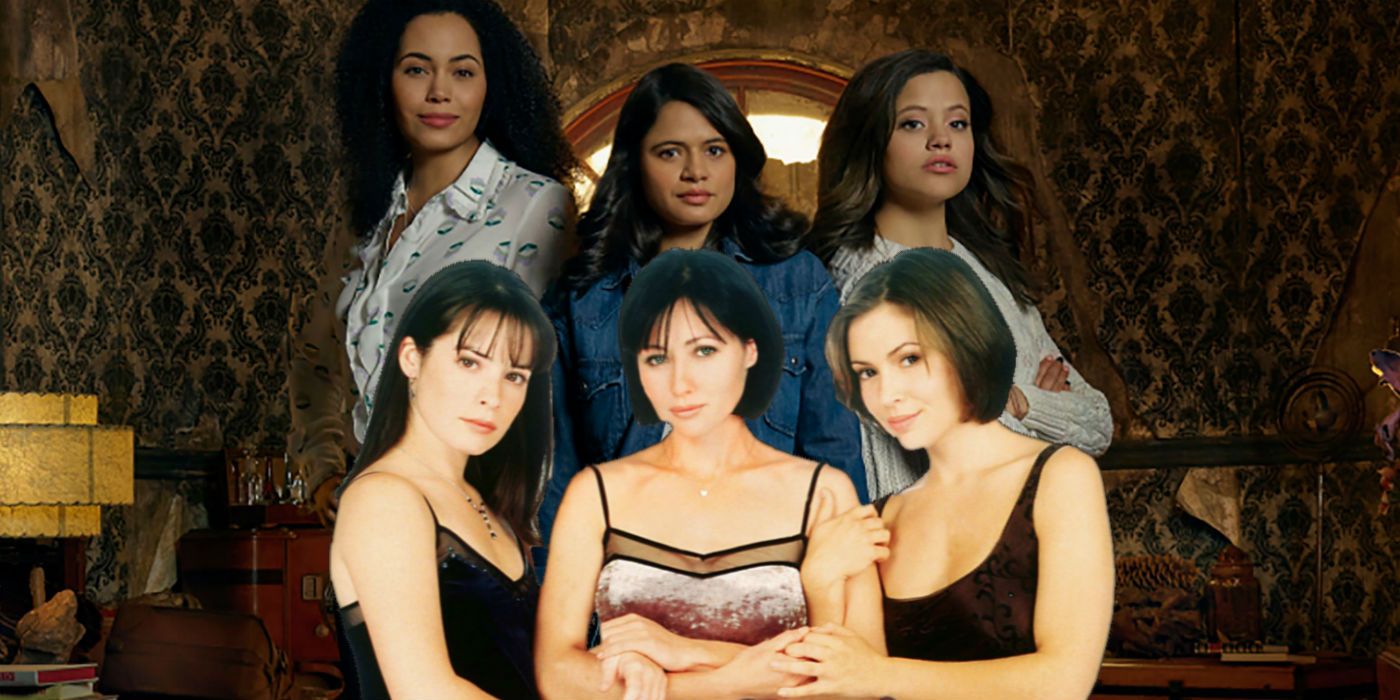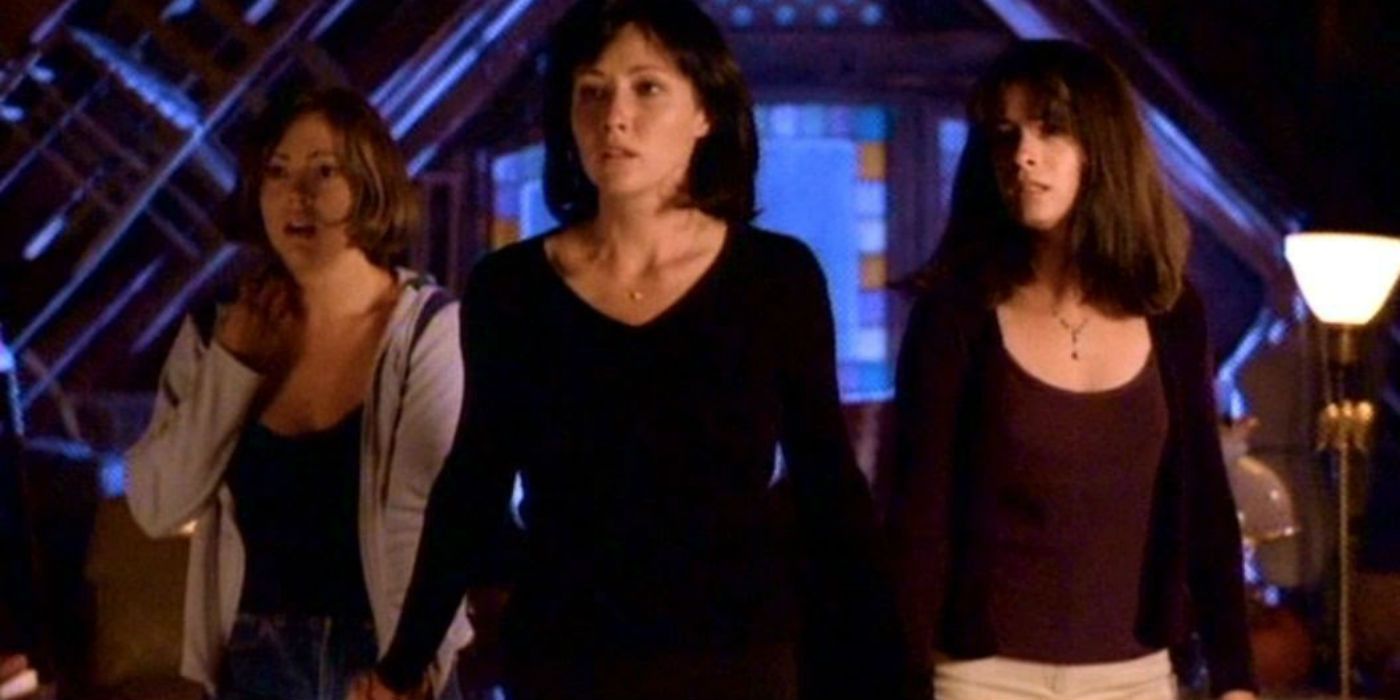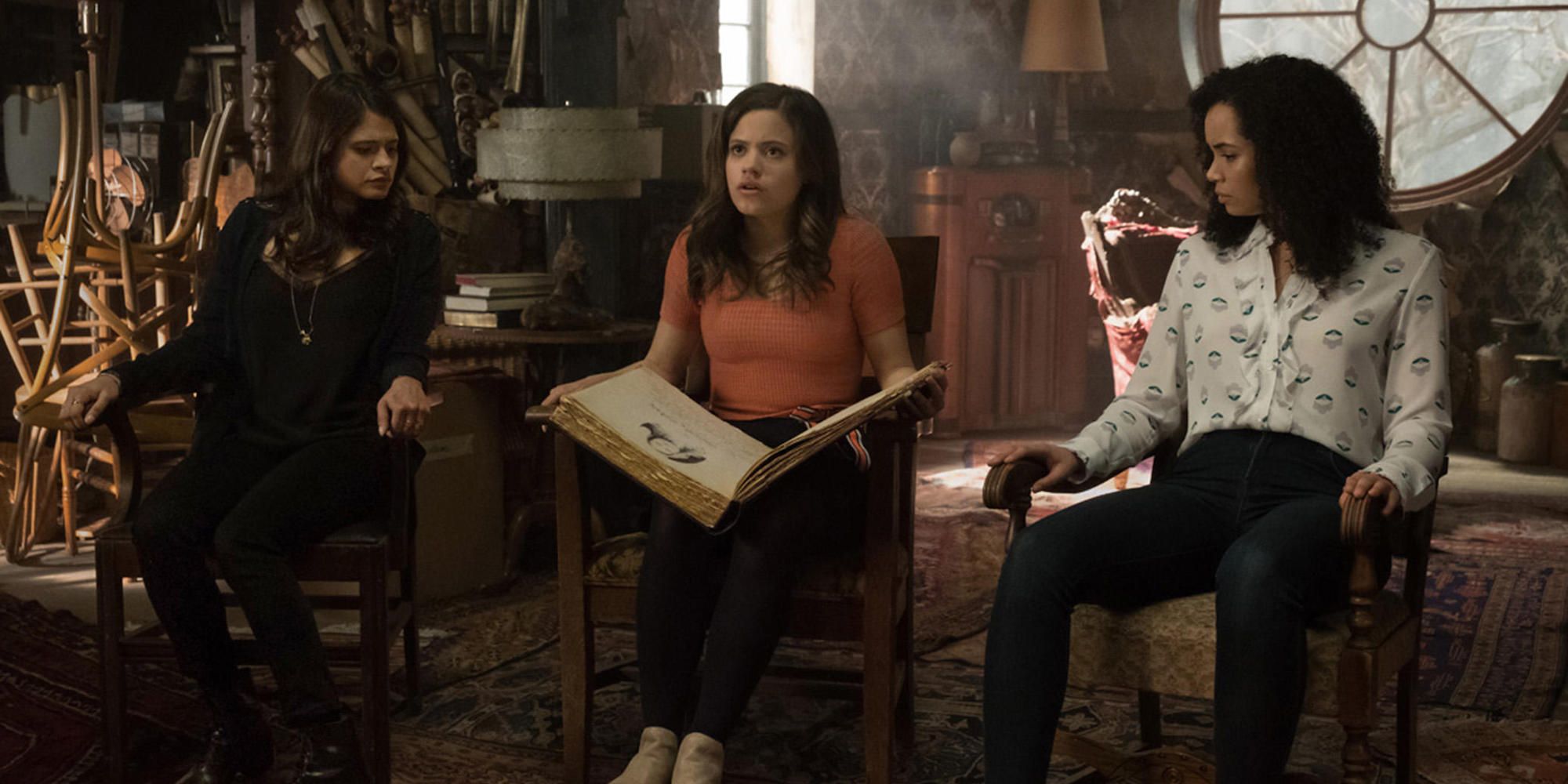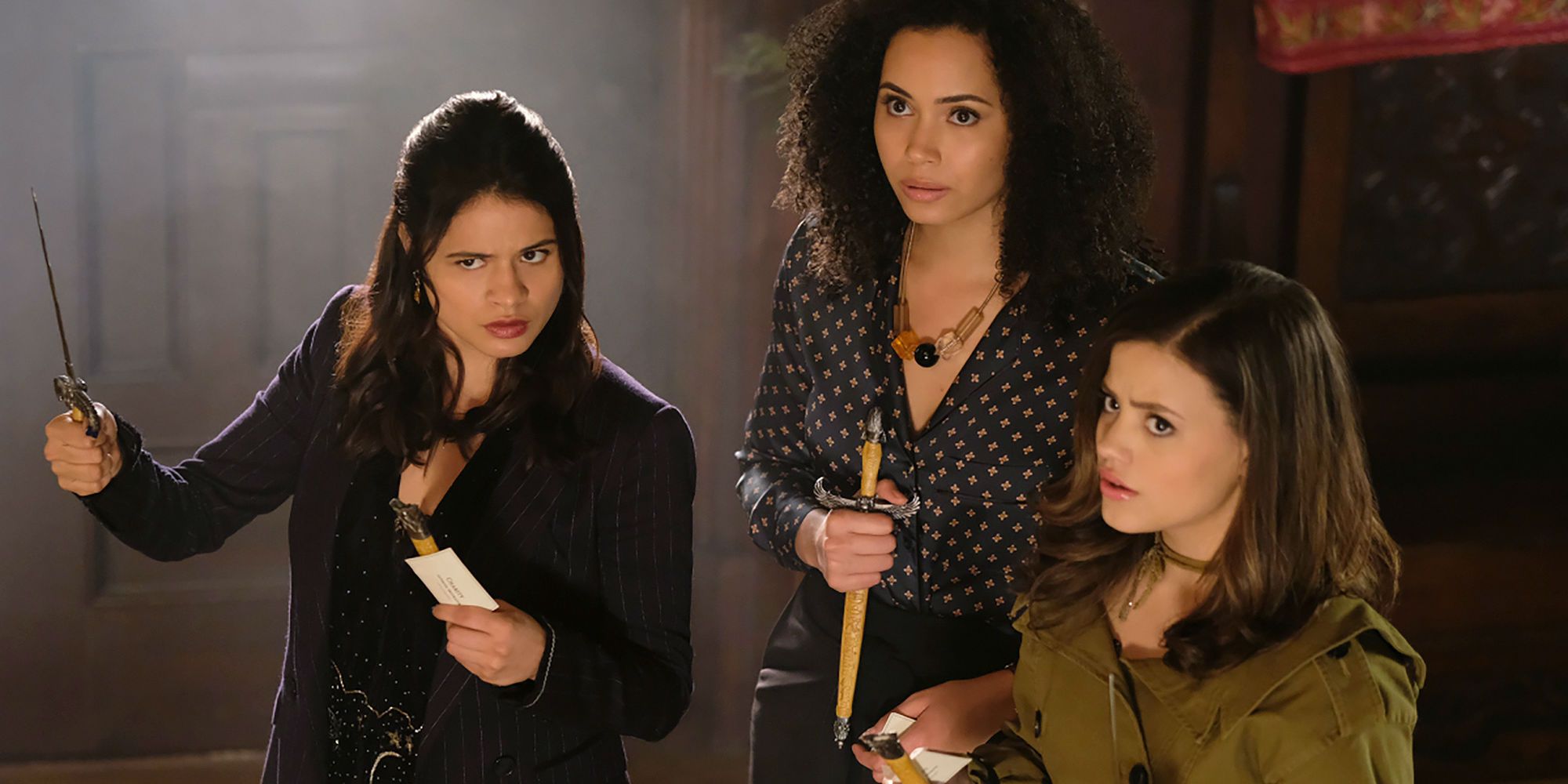
Nostalgia can often make us view older TV shows through rose-tinted glasses, but the original 1998 pilot episode of Charmed really does hold up, especially when compared to the pilot episode of The CW's recent reboot. Both shows focus on a trio of sisters - the Halliwells in the original show, and the Vera/Vaughn family in the reboot - who discover that they are witches with powerful abilities and a grand destiny. The original show ran for eight seasons and starred Shannen Doherty, Holly Marie Combs and Alyssa Milano (with Rose McGowan joining later), while the new reboot stars Madeleine Mantock, Melonie Diaz and Sarah Jeffery as Macy, Mel and Maggie, respectively.
The road to the reboot's premiere wasn't entirely smooth, with Combs commenting that while she appreciated the new opportunities creates by the show, she couldn't see what was "fierce, funny, or feminist in creating a show that basically says the original actresses are too old to do a job they did 12 years ago." Many fans of the original series were also skeptical of the reboot, and while the premiere drew solid ratings, it didn't generate much hype amid the crowded Sunday night TV schedule.
Related: Charmed Reboot to Explore Latinx Witchcraft and Women's Issues
While the Charmed reboot has some merits, and plenty of potential, the pilot was fundamentally flawed in the ways it introduced its world and characters. By contrast, the original series' pilot still holds up in ways that the reboot would do well to learn from. And no, we're not just talking about that awesome theme song.
The Halliwell Sisters Had Much More Agency

The key distinction between The CW's reboot of Charmed and the original series - and the main reason why the reboot's pilot falls short - is that the Halliwell sisters were solely responsible for getting their story started. Phoebe played around with the spirit board, which directed her to the attic, where she found the Book of Shadows and read aloud the spell that would grant the three sisters their powers. The sisters then individually discovered their abilities, with Piper using her time-freezing ability to save herself from a career disaster, Phoebe using her psychic visions to save two skaters from being hit by a car, and Prue (unwittingly) using her telekinesis to take out her frustrations on her boss/ex-boyfriend. Their Whitelighter, Leo, didn't even show up until episode 3, and his true nature wasn't revealed until almost halfway through the season.
By contrast, Mel, Maggie and Macy have their powers unbound by their mother, and while they have similar moments of experiencing their magic for the first time, they don't get a chance to figure out what's going on by themselves. Instead, their Whitelighter, Harry (Rupert Evans), kidnaps them all, ties them to chairs, presents them with the Book of Shadows and proceeds to explain their powers to them - condescendingly chiding them by saying "girls, girls" when there's too much crosstalk. He pins Mel's time-freezing powers to her "control freak" nature and says that Maggie's psychic abilities are a testament to her "desperate insecurity," while the girls do nothing to counter these charges except pout in offense.
It's possible that this is eventually leading to the sisters schooling Harry on his sexism, but for the pilot episode of a show it's simply not very compelling to have the protagonists tied up and silenced so that they can have everything about their family history and abilities explained to them by a third party. It's even less compelling for them to win their first big battle only because that same third party is in the room, explaining to them exactly what they need to do. Ironically, despite airing more than twenty years ago, the original Charmed pilot is actually more empowering for its female characters than the 2018 reboot.
Page 2: The Charmed Reboot Is Less Progressive Than The Original

The Charmed Reboot Is Less Progressive Than The Original
The Charmed pilot's failure to give its protagonists real agency is tied up with its gender politics, which are fiercely progressive... but only really on a surface level . It pays lip service to recent sexual abuse scandals by referencing Time's Up and repeating the phrase "witch hunt" ad nauseum, but Mel's militant feminism repeatedly casts her as the unreasonable party in conversations. Early in the episode she stomps through a sorority party yelling at happily canoodling couples about consent and rape culture while Maggie (quite understandably) cringes in embarrassment. Mel also tells Harry that he shouldn't be head of the Women's Studies department because he's a "cis male," he rejoinders by listing his credentials and Mel... has no comeback (though there are plenty she could have used) except a sarcastic "congratulations."
Prue had a similar story arc in the original Charmed pilot - except that it was handled in a way that made it far easier to identify with her. Instead of a strange man taking a job that should have gone to a hypothetical woman, Prue's ex-boyfriend was put in charge of a museum collection that she had successfully curated, took credit for her work, and then threatened to have her blacklisted when she decided to quit. The audience got to share Prue's frustration at the unfair treatment (something that many women can identify with), and share in the satisfaction of making Roger's pen explode in his shirt.
Related: Shannen Doherty Fully Supports CW's Charmed Reboot Series
The original 1998 pilot doesn't explicitly mention any hot button feminist topics, but it's far more empowering for one simple reason: the Halliwell sisters survived their pilot episode using their own wit and strengths, whereas Mel, Maggie and Macy would almost certainly been killed if it wasn't for Harry. In the climax of the original pilot, the three witches stand united and figure out that they need to use the Power of Three to banish Jeremy. In the climax of the reboot, they've barely begun to fight the ice demon when Maggie says, "we're supposed to call Harry." Sure enough, they call Harry, and after an entire episode of hand-holding he even has to tell them, "the spell won't work unless you use the Power of Three." If he hadn't shown up, the three sisters would probably have been nailed to the wall in a hail of ice spikes before they figured out what they were doing wrong.
How the Charmed Reboot Can Improve

Ultimately, the Charmed reboot's pilot fails on a dramatic level because it fails to empower its female protagonists: the problems aren't separate, but intertwined. The purpose of a pilot episode is to introduce the world, make the audience care about the main characters, and make them want to see more of both - and it's hard to get invested in characters when it feels like they're being shepherded around their own story. The time dedicated to having Mel harangue every male character she comes into contact with could have been much better spent in demonstrating her own positive traits - like Piper's cooking skills and her efforts to heal the conflict between her sisters, Prue's highly competent work at the museum, or Phoebe's fierce curiosity and research skills. Macy, at least, is proven to be smart and quick-thinking, but even she needs to have her own magic explained to her by Harry.
Harry really is the biggest problem with Charmed's pilot episode, so the best hope offered for the show's future is that, at the end of the episode, the sisters' spirit board tells them not to trust him. Hopefully this will convince them to stop clinging so tightly to his apron strings. If the three witches can start having their own adventures, discovering their own heritage, and solving their own problems independently of Harry, this could still become a show worth watching.
More: Charmed Reboot Trailer Teases Major Connection To Original Show
Charmed airs Sundays at 9/8c on The CW.
from ScreenRant - Feed https://ift.tt/2QXAKcC

0 Comments